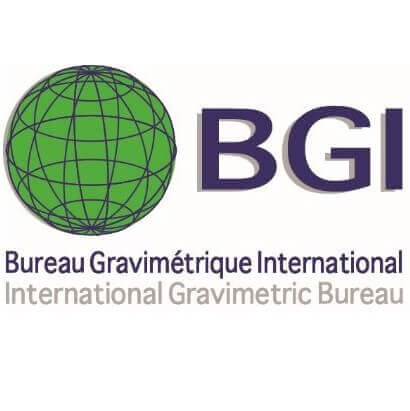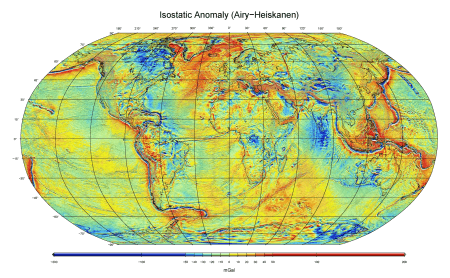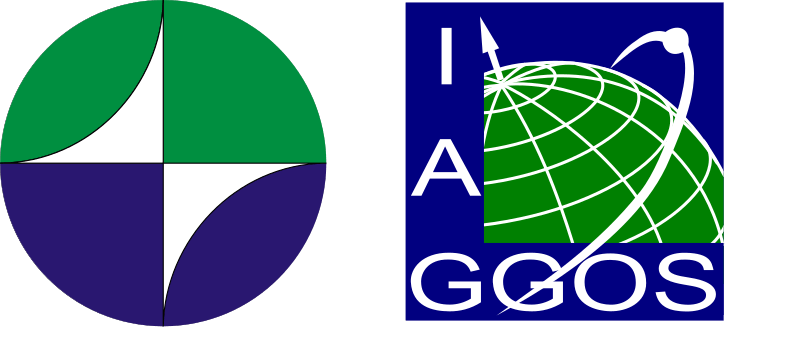BGI – International Gravimetric Bureau
Overview
The International Gravimetric Bureau (BGI) is the scientific service of IAG aimed at ensuring the data inventory and the long term availability of the gravity measurements acquired at the Earth’s surface. Its main task is the collection, validation and archiving of all kind of gravity measurements (relative or absolute) acquired from land, marine or airborne surveys and the diffusion of the derived data and products to a large variety of users for scientific purposes. Created in 1951, BGI has played a major role before the era of the satellite gravity missions (CHAMP, GRACE, GRACE Follow-on and GOCE) for supporting the computation of regional or global models of the Earth’s gravity field, primarily based on terrestrial gravity measurements together with Satellite Laser Ranging (SLR) data. It has also provided the accessibility to the global network of stations for referencing the worldwide gravity data surveys in a same absolute reference system (Potsdam and IGSN71 networks). Today, terrestrial gravity data, derived from both field (ground, airborne and seaborne surveys) and laboratory measurements, remain fundamental for the calibration/validation of the results derived from the satellite gravity missions and for providing the high-resolution components of the Earth’s gravity field, not accessible from the satellite observations.
The increasing facilities in the relative or absolute gravity measurements and the developments of new sensors (including cold-atoms technologies) facilitate homogeneous and accurate worldwide observations of the Earth’s gravity field and the determination of its variations in space and time. The BGI activities are coordinated with those of other IAG gravity services (ISG, IGETS, ICGEM, IDEMS) through the International Gravity Field Service (IGFS). Most of the databases and services (products, documentation, tutorials, software…) provided by BGI are available from the BGI website.
Missions & Objectives
The primary task of BGI is to improve the global knowledge of the Earth’s gravity field through the collection, homogenization and validation of all available gravity measurements (relative or absolute) and make this information available to a large variety of users for scientific applications. With this aim, BGI holds and maintains the 4 fundamental global databases of relative and absolute static gravity measurements and develops services and products to serve the scientific community. The most current services provided by BGI include:
- Access of gravity data, reference stations, products, software and documentation
- Archiving and validation of gravity dataset and products provided to BGI and attribution to data providers of a traceable international reference through a Digital Object Identifier (DOI)
- Realization and/or evaluation of global models (e.g. World Gravity Map) as well as regional data compilations carried out for gravity or geoid studies.
BGI also actively contributes to the definition of protocols, practices and recommendations aimed at improving the gravity data acquisition and processing and the realization of gravity surveys and networks. BGI is more specifically involved in the following actions:
- Definition and establishment of the “International Gravity Reference System & Frame (IGRS/IGRF)” promoted through the IAG Joint Working Group 2.1.1.
- Evaluation of new sensors for measuring absolute gravity (cold-atom absolute gravity meters).
- Support to the realization of national absolute gravity networks.
Finally, BGI also contributes with his collaborators to other research and development activities (software developments, research in geophysics and geodesy, etc.), to educational activities in gravimetry (summer schools, tutorials, etc.). Terms of reference of the BGI service are described in the IAG Geodesist’s Handbook 2020.
Services & Products
Global gravity databases
- Land gravity measurements
- Marine gravity measurements
- Absolute gravity measurements (AGrav)
- Reference gravity stations (IGSN71 network)
Global or regional products
Other services
- Toolbox
- Documentation on BGI data formats, gravity anomalies, absolute gravity database and tutorials
Central Bureau and Contributors
BGI has its central bureau in Toulouse, France (GET/OMP) and operates with the support of various French agencies (CNES, CNRS/INSU, IGN, IRD, SHOM, BRGM, IFREMER) and Universities (Toulouse, Paris, Strasbourg, Montpellier, Brest, Le Mans). BGI services also benefits from the close collaboration of other agencies from Germany (BKG), Italy (POLIMI), Greece (AUTH), Czech Republic (VÜGTK), Denmark (DTU) and USA (NGA). The contribution of national institutions in charge of the gravity data acquisition is also essential for ensuring a long term usability and sustainability of the highest-quality of gravity data provided by BGI.
Point of Contact
Sylvain Bonvalot (Director), Lucia Seoane (Deputy director), Franck Reinquin (Technical manager)
Bureau Gravimétrique International (BGI) GET (CNES, CNRS, IRD University of Toulouse) – Observatoire Midi Pyrénées, Toulouse, FR
E-mail: bgi@cnes.fr
Hartmut Wziontek
Federal Agency for Catography and Geodesy (BKG) – Leipzig, DE
E-mail: hartmut.wziontek@bkg.bund.de




